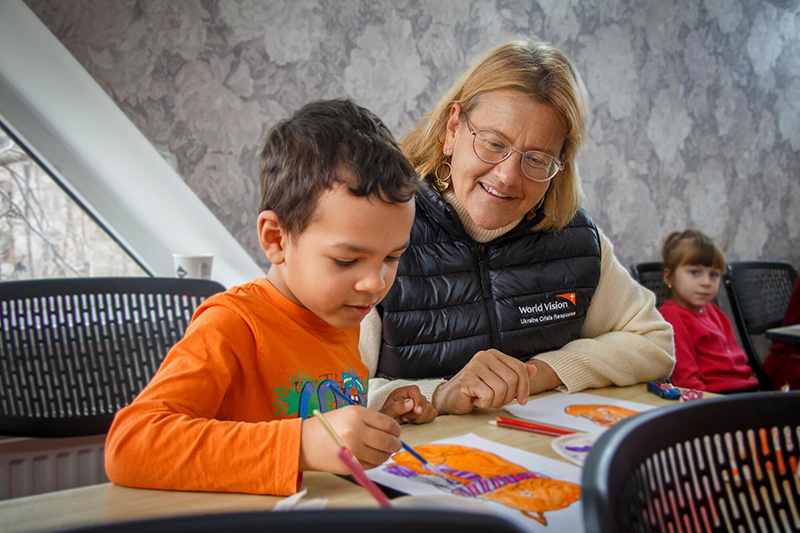Two years on, the future of over 3 million Ukrainian children is at risk
Media Contact :
February 19, 2024
Senior Public Relations Manager
[email protected]
m 404-735-0871
Media Contact :
February 19, 2024
Senior Public Relations Manager
[email protected]
m 404-735-0871

KYIV (February 18, 2024) – “I just want my father back,” says 9-year-old Eva, who lives in Lviv Oblast. She worries about her father, who is on the front lines of the war in Ukraine.
As the Ukraine crisis hits the two-year mark, at least 3.3 million children like Eva are in need of urgent aid, including protection and emotional and educational support. A new report from UNICEF highlights the impact of the war on children’s mental health, with 56% of parents in eastern regions sharing that their children are “sometimes or often anxious or tense” and nearly 2 million students—1 of every 2 in the country—reliant on online or hybrid education programs, as over 2,300 schools remain closed.
Eva says that not a week has passed without her online classes being disrupted by air raid sirens.
Eva’s teacher Roman has raised concern that children her age are missing out both educationally and socially, as this period is critical to their learning and brain development. Instead of being able to focus on their education, they are faced with attacks, blackouts and uncertainty.
“These children’s bright future hangs in the balance as the war continues. It is unimaginable why our world, with the technological advances we have reached, allows our children to suffer,” says Chris Palusky, World Vision’s Ukraine Response Director.
Twelve-year-old Viktoriia now lives in Kyiv after fleeing with her parents several months ago from Bakhmut, in eastern Ukraine. She has found it difficult to cope with loss and fear and to adjust to her new home, having left her friends and everything she knew behind.
The activities and support at a Child-Friendly Space organized by World Vision partner NGO Girls—one of over 150 such spaces that World Vision has helped facilitate for children in Ukraine and the neighboring countries of Romania, Moldova and Georgia—have given Viktoriia hope, helping her to feel less alone and encouraging her to dream again. “I want to become a diplomat,” she says proudly.
With the rate of family separation at 70%, children—particularly those who are displaced—are exposed to additional risks including sexual and gender-based violence, trafficking, and exploitation. For these children and their caregivers, the opportunity to regularly access a safe space that offers informal learning opportunities, mental health support, and social interaction is critical. Svitlana Katushina, 50, considers the World Vision–supported Child-Friendly Space in Dnipro “a real godsend” in caring for her three nephews. “Finding … this space where [the] children can learn is almost a miracle for me,” she said.
World Vision’s work has so far reached over 1.6 million people impacted by the ongoing war in Ukraine—including over 772,000 children. But with an estimated 14 million people in need, only the ongoing, focused efforts of organizations, donors and local partners, working with government agencies and communities, can address their needs both urgently and consistently.
“This is the challenge that we must not give up on, no matter how tough and complex,” said Palusky. “World Vision’s vision for every child, ‘life in all its fullness,’ is one we must keep working toward. We must continue to pray, hope and work hard for Ukraine’s children.”
About World Vision:
World Vision is a Christian humanitarian organization dedicated to working with children, families and their communities worldwide to reach their full potential by tackling the causes of poverty and injustice. World Vision serves all people, regardless of religion, race, ethnicity or gender. For more information, please visit worldvision.org or follow on X, formerly known as Twitter, @WorldVisionUSA.